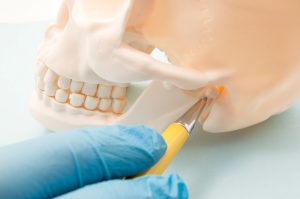 Your temporomandibular joint (TMJ) is located on either side of your face. It connects your jaw to your skull, allowing you to speak, eat, and even yawn. Most people don’t spend much time thinking about their TMJ; however, if you have a disorder that affects the joint, it can influence your quality of life. Whether you have daily facial pain, difficulty opening your mouth, or headaches, here are 5 habits to break to reduce your TMJ disorder symptoms.
Your temporomandibular joint (TMJ) is located on either side of your face. It connects your jaw to your skull, allowing you to speak, eat, and even yawn. Most people don’t spend much time thinking about their TMJ; however, if you have a disorder that affects the joint, it can influence your quality of life. Whether you have daily facial pain, difficulty opening your mouth, or headaches, here are 5 habits to break to reduce your TMJ disorder symptoms.
1. Stop Chewing Gum
Chewing a piece of sugarless gum after lunch is a great way to cleanse your mouth and freshen your breath. However, it requires excessive use of your TMJ. If your muscles aren’t given time to rest, it can increase joint soreness and stiffness.
2. Don’t Eat Hard Foods
You may want to skip taco night or having a bagel for breakfast if you have TMD. Hard and chewy foods will place excessive pressure on your jaw. Eating softer foods will take the stress off the joint to allow it to recover. Cutting your foods into small pieces will also make them easier to chew.
3. Stop Chewing on Your Fingernails
If you have a nervous habit of chewing on your fingernails or chomping on the end of a pen while concentrating, you can trigger TMJ symptoms. Para-functional habits can stress the joint and delay healing. It’s better to choose non-functional jaw activities, like tapping your fingers.
4. Avoid Chewing on One Side
If your jaw hurts, you may chew your food on one side of your mouth to lessen your discomfort. Unfortunately, this can cause stress on only one side of your face. Not only can this irritate the surrounding muscles, but it can also cause uneven wear on your teeth.
5. Stop Clenching Your Teeth
Many people grind and clench their teeth, which is called bruxism. Whether you grind during the day or while you’re sleeping, it can cause extreme stress on your jaw’s muscles and joints. It can also damage your teeth, increasing your risk of breaks, fractures, and tooth loss. Since bruxism is often a subconscious habit, your dentist can provide you with a nightguard. It will provide a cushion between your upper and lower teeth to absorb the force. This can improve your jaw pain while protecting your teeth.
Get TMJ Disorder Treatment Today
You don’t have to live your life around your jaw pain. Your dentist can provide the solutions you need with TMJ therapy. They’ll create a personalized plan to improve your jaw functions and restore your quality of life. You won’t have to think twice about biting into a juicy hamburger.
About Dr. West
Dr. West earned her dental degree from the University of Southern California Dental School and continued her education in sleep apnea and TMJ therapy. She specializes in neuromuscular and craniofacial pain. If you’re ready to conquer your TMJ pain, contact our office today to request your consultation.
